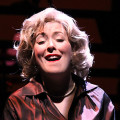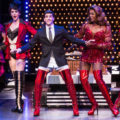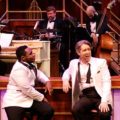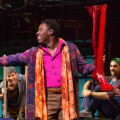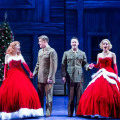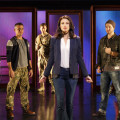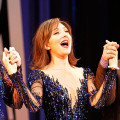Demons duke it out with genius throughout “Charlie Parker’s Yardbird- A Chamber Opera”
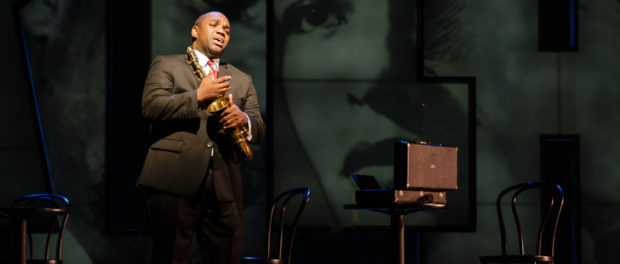 Photos provided by Dominic M. Mercier/ Opera Philadelphia
Photos provided by Dominic M. Mercier/ Opera Philadelphia
Jazz trailblazer Charlie Parker once said “if you don’t live it, it won’t come out of your horn,” and it’s such presumed anguish that serves as the centerpiece for the Lyric Premiere of “Charlie Parker’s Yardbird- A Chamber Opera” at the Harris Theater. Although anyone who appreciates the genre is surely aware of the saxophonist and composer’s incalculable influence on bebop and beyond, chances are the heart-wrenching extent of his personal demons will be a revelation to many thanks to a series of revelations by librettist Bridgette A. Wimberly.
“Yardbird” isn’t entirely tragic, instead offering some hope in the fact that Parker’s legacy continues to burn bright well outside jazz circles.
Fully embodying the personality of Bird, Lawrence Brownlee is a well-studied master from the moment Parker is pronounced dead at the start of an emotional 90 minutes, which takes attendees on a flashback through its namesake’s most famous and infamous moments as he pleads for more time to write one final masterpiece. In order to do just that, the Grammy Hall of Famer figuratively lands in Birdland (the New York City club christened in his honor), but before being able to focus fully on creativity, many friends and relatives appear to air their grievances or make their peace in this purgatory-like state.
 A panic-stricken friend (possibly with benefits) known as Baroness Nica (Julie Miller) is first in line, and considering he died in her room at a racially segregated hotel, she begs him to keep the death a secret to avoid family scandal. Additional visits include his constantly concerned but always proud mother Addie Parker (Angela Brown), his three wives (Rachel Sterrenberg as Chan, Angela Mortellaro as Doris and Krysty Swann as Rebecca), plus frequent collaborator Dizzy Gillespie (Will Liverman), who helps reignite Parker’s muse in between loads of domestic drama.
A panic-stricken friend (possibly with benefits) known as Baroness Nica (Julie Miller) is first in line, and considering he died in her room at a racially segregated hotel, she begs him to keep the death a secret to avoid family scandal. Additional visits include his constantly concerned but always proud mother Addie Parker (Angela Brown), his three wives (Rachel Sterrenberg as Chan, Angela Mortellaro as Doris and Krysty Swann as Rebecca), plus frequent collaborator Dizzy Gillespie (Will Liverman), who helps reignite Parker’s muse in between loads of domestic drama.
Throughout it all, one of the most affecting (and always completely wordless) cameos come from an uncredited, wheelchair-driving drug dealer named Moose The Mooch, further demonstrating heroin’s extreme grip on the innovator, so much so that his 34-year-old body is assumed to be a senior citizen in the morgue. But before he winds up cold and lifeless, there’s still the death of an infant child to endure, followed by a harrowing trip to the mental hospital while being confined to a straight-jacket.
Nonetheless, “Yardbird” isn’t entirely tragic, instead offering some hope in the fact that Parker’s legacy continues to burn bright well outside jazz circles. A case in point is this very chamber opera, which is a massive undertaking overflowing with talent and a truly magnificent work, though it’s worth pointing out only a few snippets of Bird’s actual work appear in favor of original content conceived by Daniel Schnyder.
Those hoping for a better balance of both won’t really find it in the main program, but upon its completion, are thankfully treated to such notable works as “April In Paris,” “Hot House” and “A Night In Tunisia” (amongst others) from the exquisite Chicago Jazz Philharmonic. This mini concert affords the Windy City an extra chance to be blown away by what once came out of Parker’s primary instrument, which is only magnified after experiencing the prior pain that fueled such genius.
“Charlie Parker’s “Yardbird” returns to the Harris Theater on Sunday, March 26. For additional details, visit LyricOpera.com.

